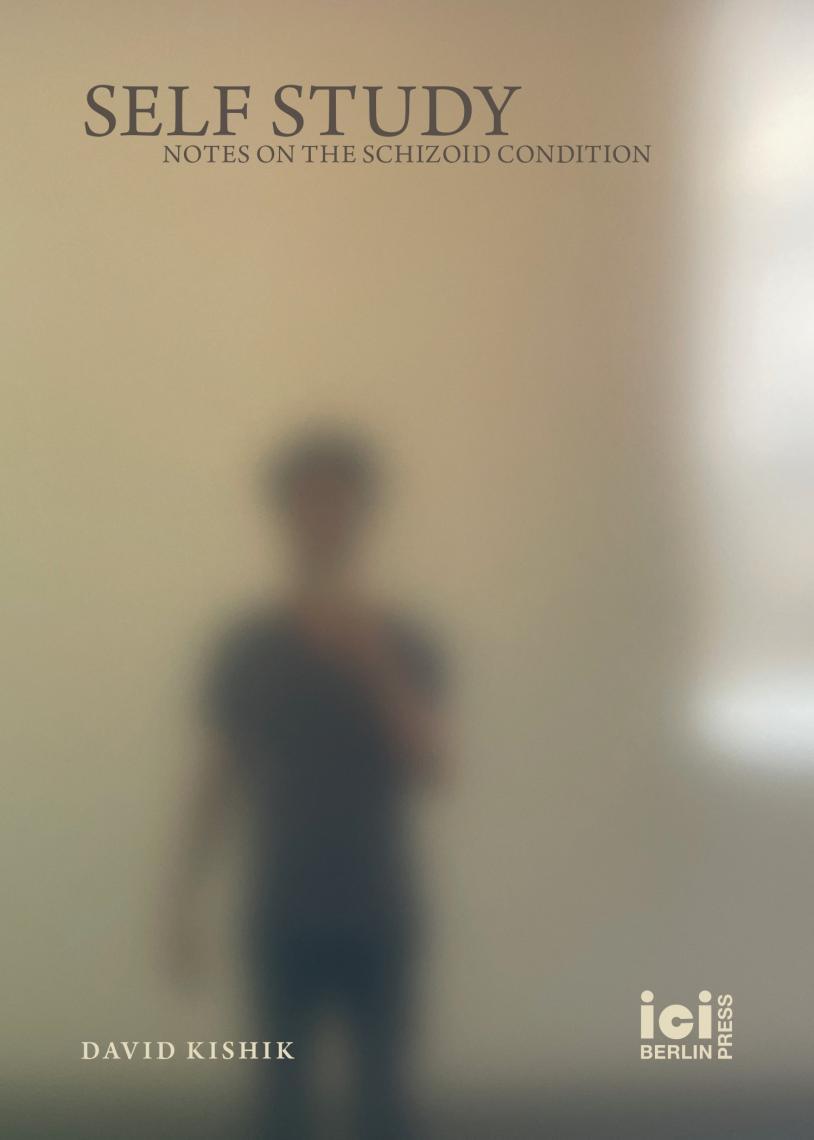Ici Berlin Press
Self Study
Self Study
David Kishik
Self Study
Notes on the Schizoid Condition
Berlin: ICI Berlin Press, 2023
Self Study is a genre-bending work of autophilosophy. It opens a rare, rear window into the schizoid position of self-sufficient withdrawal and impassive indifference. This inability to be enriched by outer experiences feeds the relentless suspicion that hell is other people. Laying bare his life and work, Kishik engages with psychoanalysis, philosophy, and cultural inquiry to trace loneliness across the history of thought, leading to today’s shut-in society and the autonomous subject of liberal capitalism.
David Kishik is the author of To Imagine a Form of Life, a series of books in which Self Study is the fifth and final volume. Previous titles include The Book of Shem and The Manhattan Project, both published by Stanford University Press. Some of his shorter texts appeared in the New York Times, Los Angeles Review of Books, and Lapham’s Quarterly. He lives in New York and teaches at Emerson College.
How can reading about a condition defined by being withdrawn, antisocial, or unemotional be so thrilling, make one feel so accompanied and connected? Welcome to the paradox of David Kishik’s Self Study, a slim book which gave me on every page something to admire. I love its complex lucidity, its casual yet incisive interaction with a variety of thinkers, its fresh take on a field of research Kishik would term ‘self studies’. The author may propose these notes as the finale to a series, teetering on the end of writing, but to me they feel like a beginning — of a new chapter in Kishik’s writing life, perhaps, and a new, inspiring mode of living in and around philosophy. — Maggie Nelson, author of several acclaimed books of poetry and prose, including On Freedom (2021), The Argonauts (2015), The Art of Cruelty (2011), and Bluets (2009)
Autophilosophy, in this ornate and seductive book, is an attempt by the author to explain himself to himself, to study his own work in the absence of others to do it for him, and to tell his story to himself. Digging in to the schizoid position, David Kishik examines his blind spot and finds himself there. Weirdly compelling, I encourage you to read this book without needing to know why in advance. Here you will find a not-self, not finding truth and not telling us about it. — Jack Halberstam, author of The Queer Art of Failure (2011) and Wild Things (2020)
This is a superb study of the schizoid condition—of what is unique but also what may be universal in this peculiar variant of human existence. David Kishik considers from within what it is like to feel utterly isolated and apart, and treats these issues on a psychological and cultural as well as a philosophical plane. Self Study is an indispensable book for those interested in the agonies as well as the insights, the pleasures as well as the paradoxes inherent in human separation and self-consciousness. — Louis Sass, Distinguished Professor of Clinical Psychology, Rutgers University, and author of Madness and Modernism and The Paradoxes of Delusion
At a time when most autofictions seek self-empowerment, David Kishik writes a plea for weakness. His risky autophilosophy exposes a vulnerable and constitutively dependent self. In witnessing himself wholeheartedly, Kishik critiques our present time, when global, net-based capitalism knows how to extract profits out of a deeply divided self. In light of his own fragility, he sees an opportunity to no longer reject the schizoid human disposition. Out of this emerges a new, anti-academic thinking and an aesthetic of a fractured existence. — Kathrin Busch, Professor of Philosophy and Aesthetics, Universität der Künste Berlin
Philosophers, Kishik claims, are inherently schizoid, retreating from the world and others into an impersonal, imaginative realm. Philosophical writing only compounds the problem. Self Study is Kishik’s attempt to escape this predicament, celebrating not so much the love of wisdom, which only deepens the schizoid condition, but the wisdom of his very particular and extraordinary love. In this elegant, elusive work of autophilosophy, crowning his five volume work of experimental scholarship, Kishik aims not only at knowing himself, but in losing himself, too. You won’t find a recounting of the trivial life of an academic here; this philosophical selfie shows all we philosophical flies a way out of our fly-bottles. — Professor Lars Iyer, Creative Writing, Newcastle University
Where is the line between honesty and self-flagellation? Authenticity and exhibitionism? Between self-discovery and the dawning of its impossibility? This book treads that line. It is a courageous — bordering on self-destructive — attempt to convey oneself. — John Kaag, Professor of Philosophy, UMass Lowell
‘[T]he very project of theorizing the self is inherently self-displacing as much as (or rather than) self-centering: the implicit claim of authotheory is that one can best articulate oneself precisely by way of a circuit out, both toward other writers and toward some Other that is denoted Theory. One question raised immediately in this book, then—which employs the desirous, intensely related autotheoretical mode to document states of isolation—is whether the form matches the content, or the claim; that is, whether the writing is best understood as a manifestation of the schizoid condition, or its cure.’ — Emma Lieber, ‘Book Review Essay: Psychoanalysis and Culture, Then and Now’, The European Journal of Psychoanalsis, 20.2 (2024).
ISBN 978-3-96558-045-9 | Paperback | 12 EUR | v, 174 pp. | 17.8 cm x 12.7 cm
ISBN 978-3-96558-046-6 | PDF | Open Access | 2.6 MB
ISBN 978-3-96558-047-3 | EPUB | Open Access | 2.8 MB
ISBN 978-3-96558-046-6 | PDF | Open Access | 2.6 MB
ISBN 978-3-96558-047-3 | EPUB | Open Access | 2.8 MB
Regular price
€12.00 EUR
Regular price
Sale price
€12.00 EUR
Unit price
per
Tax included.
Shipping calculated at checkout.
Couldn't load pickup availability


